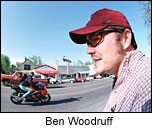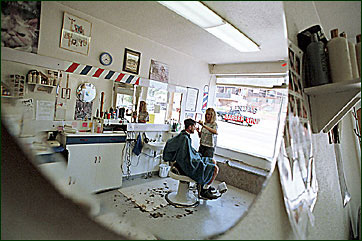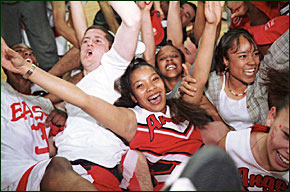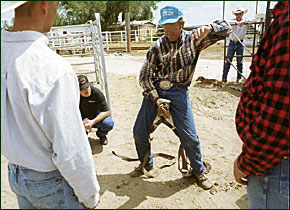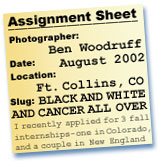 |
|
|
|
|
|
BLACK AND WHITE AND
CANCER ALL OVER I recently applied for 3 fall internships - one in Colorado, and a couple in New England. How excruciating. The
process is completely self-critical and ends up with almost no feedback.
I felt better after my last root canal than after sending out my portfolio.
When I was first putting my portfolio together a while back I decided I needed to have something cheap, easy to put together, easy for a photo editor to use, clean in its presentation, and usable on both PC and a Mac. I chose an html based CD presentation, because most every computer has a web browser, and loading off a CD, even large, high-quality images, would be fast. All would have been fine had I stuck with the original layout of the folio, but I felt rich and wanted a nicer interface, so I bought a copy of Macromedia Dreamweaver from my local college bookstore (hey $99 is a good deal). New working interface, and new possibilities. Major headaches. Instead of changing a couple links and making a few new pages, it became a major overhaul, with hours spent staring at the screen of my laptop. After roughly a week of work and feedback on the book, I turned to the task of the resume and cover letter. I'm in an interesting situation, as I have 3 years of experience working more-or-less full-time, but am only going into my junior year of school. So while I have as much or more experience than many applicants, I am one-to-two years behind them in my education, nor am I a photojournalism or even journalism student. What points should I highlight in my resume, how creative should I be in writing my cover letter? I wrote a standard, pretty boring letter, but it didn't feel right, so I wrote one about my passion and about getting outside my box of the Front Range of Colorado, where I have spent my entire life. The end result probably was a little less professional, but it better conveyed how I feel about photojournalism. Having finished my resume, cover letter, and portfolio, I went down to the post office to mail it off. Through a mix up while labeling three express mail envelopes, I sent the wrong cover letter to the wrong place. Both are in New England, and are owned by the same company. About 4 weeks passed and I heard that someone else was hired for the internship in Colorado.
What really bothered me were the reasons why they hired who they did. I guess this counts as feedback, but only as a shot in the dark way. In the letter, they outlined how good their portfolio was, and how good the photo stories were for the person they hired. While in theory, this is nice, in reality it leads to much second-guessing. Because while it says how good their stuff was, it gives no reference as to how mine compared. Realistically, there is no way for any photo editor, even with the relatively few applicants for a position such as this, to give specific feedback to each person. Instead of telling me what they liked about my portfolio, they told everyone what they liked about the new interns book. They liked the story about a kid with cancer, and loved the black and white story about an elderly person. First: A story about a kid with cancer? Cancer kid stories are always so original and have such a broad impact. Second: black-and-white? The last time I shot something in black and white was the last basic photography class I took. In working for a daily newspaper for the past 3 years, I haven't had a need to shoot black-and-white. Sometimes color can mess up the meaning of a photograph, a carefully composed color photograph has at least as much meaning and impact as anything black-and-white. I don't see the world in shades of gray; I see color. So the question I have for anyone who reads this is... What should I do? Should I quit working on stories that are important to me, like the drought, and a river that provides a lifeline to Northern Colorado and Western Nebraska, so that I can do the more newspaper friendly stories about old people or kids with cancer?
Maybe all of this is just a reaction to the rejection. In fact, I'm sure it is. But I also believe that I can try to make photojournalism what I think it should be, something more conceptual, something with a broader impact. Of course readers will love the little girl with cancer, but I would rather show what environmental conditions researchers believe lead to cancer....would rather visually explore the sociological conditions that lead to homelessness or drug addiction, or school violence, than watch an old lady die through my viewfinder. If I can accomplish only one thing in my career, I want it to be this... I want to educate. Not in the instructing budding photojournalists at a college, although that could be fun, but society in general. I want to make everyone that looks at my work better informed, even if it just about the world in their immediate area. Ben Woodruff |
|||||||||
